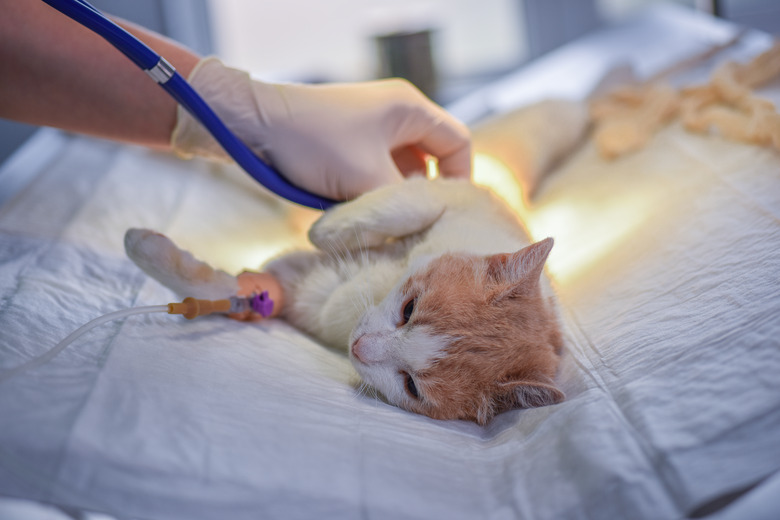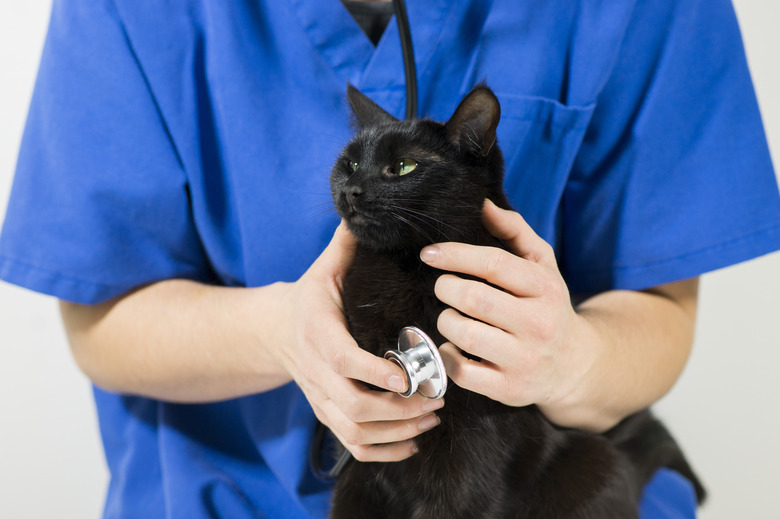Can Cats Get Colds? Everything You Need To Know About Cat Colds
A runny nose, watery eyes, perhaps a wet or dry cough . . . you've probably experienced at least one of these cold symptoms over the years, and did you know your cat can too? Bacterial, fungal, and viral infections can get cats sick, and often, these felines will display similar symptoms to our own colds, including those listed earlier. Severe cases, or colds left untreated can, in some cases, also result in ulcers on the mouth or eyes, fever, difficulty breathing, pneumonia, and even internal bleeding. Needless to say, treating your cat's cold should be a priority, and learning how to spot these common cold symptoms is your first step toward getting your cat back in healthy condition.
Respiratory diseases in cats
Respiratory diseases in cats
Upper respiratory infections are an extremely common type of illness among cats, especially in an area with many other felines, like a shelter, kennel, or even an outdoor cat colony, where transmission is more likely. Many of these infections are caused by viruses, like feline herpes virus, although they can also be brought on by bacteria or fungi. "Feline herpesvirus is the most common respiratory disease among young cats, and up to 97% have been exposed at some point," says Dr. Shagufta Mulla, a veterinarian from Colorado State University with 20 years of experience as a small animal veterinarian. These symptoms appear the most like a common cold, including coughing, sneezing, and runny eyes, among other signs. Feline calicivirus, which can lead to pneumonia, is another highly contagious respiratory infection, although it's much less common, as is feline Chlamydophila, which requires very close contact to transmit among cats.
Outdoor cats and colds
Outdoor cats and colds
If your feline friend gets to wander outside, they're going to be much more likely to catch a cat cold than a cat who lives indoors due to the fact that they're just going to be exposed to far more cats and other animals. Feral cat colonies are common spots where cats can transmit cold viruses, and bacteria. "Cats can also pick up fungal infections, but cats are more likely to pick up fungal infections by inhaling the spores from the soil or bird droppings and not from cat to cat spread," says Dr. Mulla.
Cats who roam outdoors can also catch harmful bacteria from infected prey animals, like rats, birds, and mice. If you let your cat outside, be sure to keep them up to date on their vaccines, and treat any injuries or symptoms of a cold immediately, keeping them indoors and away from other cats until they've improved.
However, Dr. Mulla says that even with vaccinations, it is important to be aware that not all respiratory pathogens that cats can pick up from wildlife are preventable with vaccines. "For example, cats can pick up certain avian influenza viruses," Dr Mulla explains.
How do indoor cats get colds?
How do indoor cats get colds?
So, if a cat doesn't go outside, how does it get sick? Your indoor cat can get sick anytime they come in contact with a virus or bacteria. This can include trips to the vet, visits to the groomer, or other outings where fellow felines may be around (don't be scared to take your cat to these places!
"Though it's not common, there have been cases of cats in the United States that have been infected with canine influenza H3N2," says Dr. Mulla. "Plus, indoor-only cats can also pick up fungal infections. Histoplasma capsulatum can be in the soil of potted plants. Or a person can track soil or bird droppings indoors via their shoes or their bicycle tires, which might contain other fungal organisms like Blastomyces dermatitidis."
While cold contraction is certainly possible, it's not guaranteed, or even common, especially if your cat is vaccinated.) Cats will most often become sick when they're in contact with another sick cat, or perhaps a cat who's not yet been vaccinated from common viruses, like feline herpesvirus.
Dr. Mulla clarifies that "herpes, calici, and Chlamydophila vaccinations do not completely prevent infection," she says. "Vaccination for these diseases reduce the severity of symptoms if a cat becomes infected."
If your cat is a mouser or other hunter, they can like their outdoor counterparts, contract viruses and bacteria from rodents or birds that they catch. This is why it's always a good idea to keep your indoor cats vaccinated as well, and check with any potential boarding providers about known outbreaks, as well as their cleaning policies.
Cat cold symptoms
Cat cold symptoms
Cat cold symptoms will vary depending on the exact cause, but for the most part, cat colds can look a lot like human colds. These first signs can include sneezing, coughing, watery or mucousy eyes, loss of appetite, and lethargy. In some cases, your cat may exhibit more worrisome symptoms, like hair loss, ulcers, bleeding, difficulty breathing, vomiting, and diarrhea, among others. Cats are well-known for hiding their pain and discomfort when they're not feeling well, and will often withdraw or retreat, so if you notice yours hiding out more than usual, be on the lookout for additional symptoms.
How to treat a cat with a cold
How to treat a cat with a cold
Sometimes, a cat's cold will show signs of improvement on its own, especially if they're given plenty of fresh water, food, and a safe, warm place to catch up on sleep. In other cases, you'll need to see a veterinarian for a diagnosis, and a proper treatment plan, complete with the right medicine to get rid of your cat's cold. When treating a cold, you'll want to get their immune systems in healthy working order again by making sure they're fed, drinking plenty of water, and getting enough rest. If your cat is congested, which many cats experience with upper and lower respiratory infections, adding a humidifier to your home may alleviate discomfort, and get your cat breathing better in little time. "It also helps to warm up their food by adding a little warm water so they can smell it better," suggests Dr. Mulla.
As with any communicable illness, take care to keep your sick cat away from other pets in your household, and administer all medicine as directed by your veterinarian. Clean and disinfect your cat's area regularly, including the litter box, especially if they have diarrhea or vomiting. You may also need to treat secondary symptoms, like stomach upset or loss of appetite, so ask your veterinarian for the best course of action if your cat is displaying these symptoms as well.
Cat medicine for colds
Cat medicine will vary depending on the cause of the cold, and will need to be prescribed by a veterinarian after they've properly diagnosed your feline friend. Some common medicines used to treat cat colds include amoxicillin, tetracyclines, and fluoroquinolones, and some cats may be given saline solutions or nebulizer treatments to alleviate some of their symptoms. It is not recommended that cat parents use essential oils or other at-home treatments to treat their cat's cold, as doing so can prolong the illness, or may result in other undesirable side effects.
Can cats take cold medicine?
Cats can, and should, take medicine for their colds and cold symptoms, however, it should never be an over-the-counter medication that's intended for humans.
Can cats catch colds from humans?
Can cats catch colds from humans?
It is possible for a cat to catch colds from humans. The Centers for Disease Control & Prevention (CDC) says that some studies suggest that it is not uncommon for cats to catch colds from humans. Less is known about whether or how often cats spread influenza to human because it depends on the type of virus and how long the human is exposed to it. But it can happen.
When should I worry about my cat sneezing?
When should I worry about my cat sneezing?
You know your cat better than anyone else, so when you see abnormal behavior for more than a day or two, it is a good idea to seek veterinary care from your DVM (veterinarian) to see if something needs to be treated.
"Even if you don't suspect that your cat is sneezing from a cold, not eating normally for even a day or two is reason enough to seek veterinary attention," says Dr. Mulla. "Appetite is extremely important in cats and not eating well for even a day or two can, in some cats, lead to a serious condition called hepatic lipidosis."
Sneezing can sometimes occur due to allergies, or just a foreign object, like dust, in their noses, but if it doesn't clear up on its own fairly quickly, it's recommended that you seek medical attention. This is especially true if you have other cats or pets in the home, if your cat roams outside, or if you're planning to board your cat in the near future, as you want to reduce the risk of passing a possible cold.



